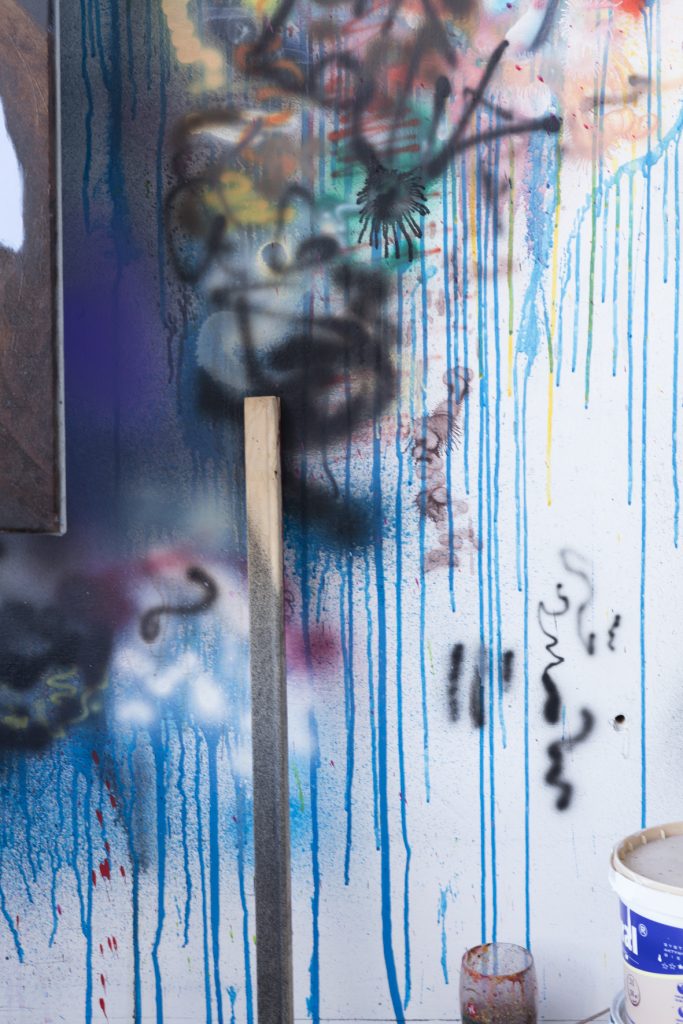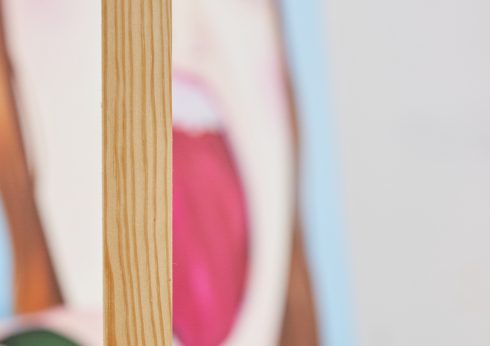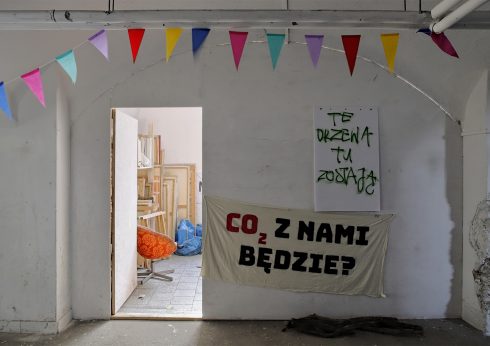
Dawid Czycz’s studio
Anna Stankiewicz Małopolski Instytut Kultury w Krakowie Dawid Czycz interviewed by Agnieszka Jankowska-Marzec A.J.M.: Is this (...)Dawid Czycz interviewed by Agnieszka Jankowska-Marzec
A.J.M.: Is this the first studio where you have had the opportunity to work on your own?
D.Cz.: Yes, and it makes me very happy. Earlier I worked in a flat I shared with my life partner Monika Chlebek, who is also a painter. We earmarked a room of 11m² for the studio, divided it into two parts with a tape, so you can imagine that the arrangement was far from comfortable.
A.J.M.: Your studio is in the Azory district, in a former shopping centre probably from the 1970s. Was this place given to the artists to work?
D.Cz.: It’s not that good. I found it on the list of auctions of the Municipal Buildings Authority, so it is a municipal building, and it is used by artists, not only visual, and at the same time it retains its commercial functions. A floor below, two married musicians teach music, their neighbour is the warehouse of the Good Lood ice cream manufacturer, and the whole floor next to my studio is taken up by a second-hand clothing store.
A.J.M.: How do you feel working in such an environment?
D.Cz.: Fantastic! The only downside is the small size of the studio, but the great big windows that let in plenty of light are a great benefit, although on the other hand, such being in full sun in summer is troublesome as the temperature inside exceeds 36°C. Yet in winter it is cosy and warm, the windows are draught-free for they were recently replaced together with the whole façade. It would be embarrassing to be fussy.
A.J.M.: What conditions do you need to work then?
D.Cz.: I need peace, a realisation that I can isolate myself entirely from the surroundings and have an opportunity to listen to loud music. It’s important that I don’t have to worry that the noise is disturbing the neighbours.
A.J.M.: And you begin your day at the studio with…
D.Cz.: With coffee. Actually, whenever I am at work, I drink gallons of coffee, and, as I’ve mentioned, as soon as I arrive, I turn on the music (that is the radio or my equipment for playing music). If I can’t “tune in to” the music I am listening to, I know I’m not making a good painting, that is, I realise I’m not in the mood for painting.
A.J.M.: I have to ask you about the music you listen to.
D.Cz.: I have an extensive range of music interests, from electronics, via punk rock, to jazz. However, when I work, I need mostly dynamic music, hard rock, electrifying sounds that stimulate me while painting. I am also fascinated with African music and drumming. I made one, the biggest one, myself. Sometimes friends visit me and we organise joint music sessions, playing the drums. Music not only motivates me to work but also lets me chill out and think about something else than just the creation of another painting. I even used to play in a punk rock band but I’ve never treated that activity professionally, rather as a hobby.
A.J.M.: So, you’re not a loner, holed up in your studio, are you?
D.Cz.: No, I’m not, but I am only visited by a small group of people: friends I make music with and my partner, Monika. The studio is my place of work and not for partying or, for example, organising mini exhibitions. This is my private “piece of space” where I can do anything without considering the needs of any other person. I can make a mess, even though I can always find what I’m looking for, because once I have tidied up the place, for example before you arrived, it’s not that easy to remember where I have put something. The only concession towards pedanticism is the ritual of cleaning the brushes after I’ve finished work, because I simply don’t want paint to dry on them.
A.J.M.: Looking around your studio I noticed, other than the brushes and the paints, two bikes, a map on the wall, and obviously the paintings you’re working on.
D.Cz.: I don’t much like things distracting me from work, so I don’t hang either my finished works or friends’ paintings (which I have at home instead). The presence of the bikes in the studio is for me a necessity. I keep them here because they are my main means of transport. I’ve got several, some to ride around the city, others for cross-country, because I very much like to get crazy on a bike in the woods.




